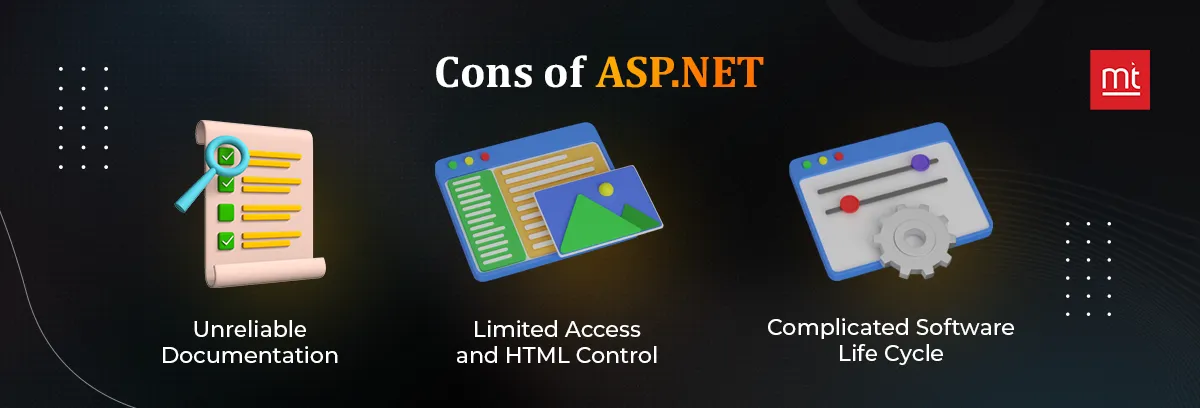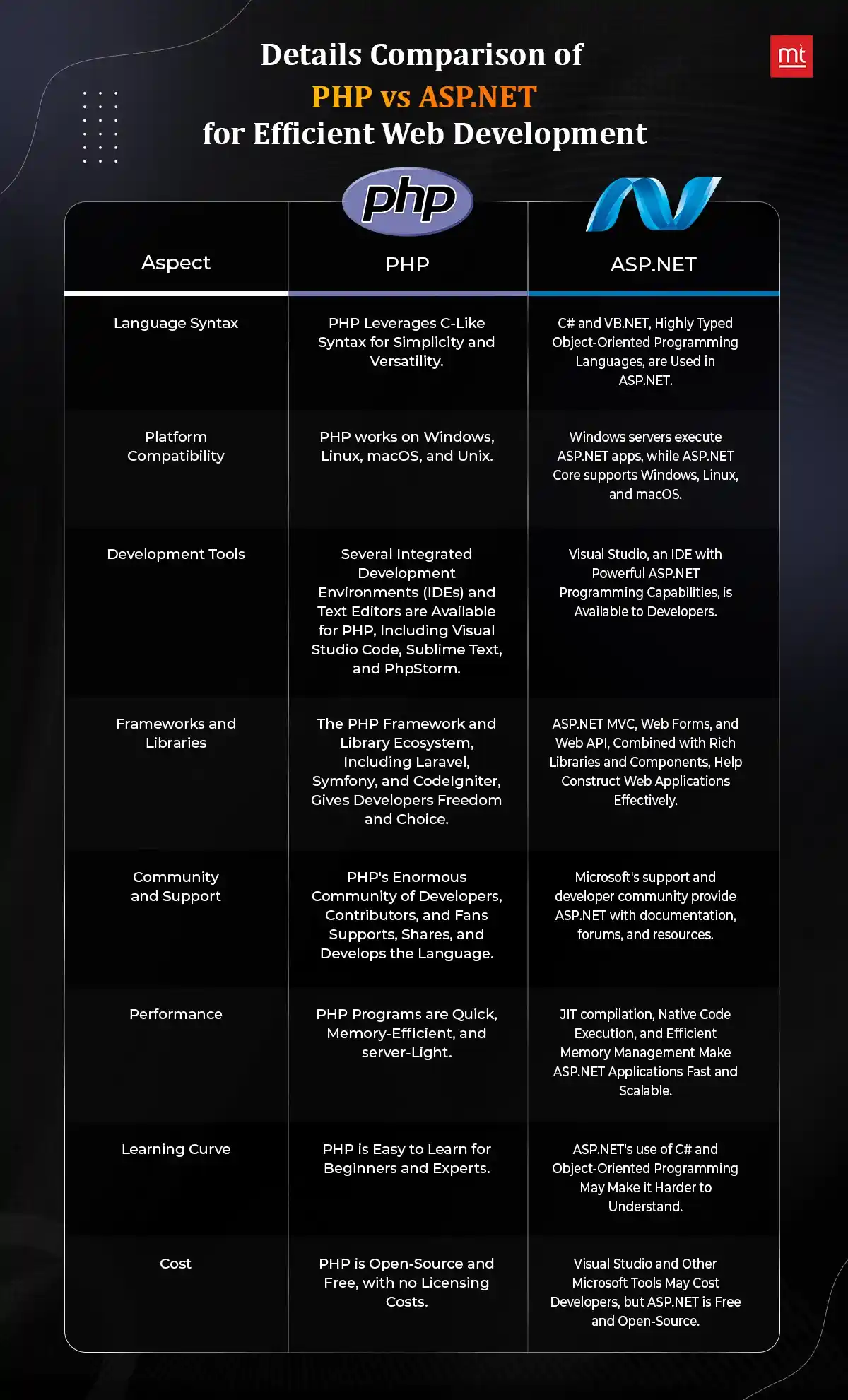Get Free Trial Week Developer Access, Try Before You Hire. Click Here to Claim Now
Introduction:
Web development is gaining importance for businesses to secure their position in the digital world. Businesses with eye-catching and user-friendly web apps get their brands noticed. The web development market is set to cross $80,000 million by 2027. To dive into a sea of remarkable markets and develop the best solutions, businesses must choose from the best web development technology. This is where the head-to-head debate of PHP vs. ASP.NET begins.

PHP and ASP.NET are two leading names in the web development market and the reason behind giant web applications like Facebook, Etsy, Dell, etc. Both options come with impressive features and capabilities to give wings to any web app idea:
The question remains: ASP.NET vs PHP: Which is the right choice for web development? No more hopping around; keep reading. Here, we have summarized the differences between PHP vs ASP.NET to help you make an informed choice.
What is PHP?
Hypertext Preprocessor (PHP) is a widely used open-source web programming language. Developed by Danish-Canadian programmer Rasmus Lerdorf in 1994, it is flexible and user-friendly and has a strong user community.
PHP allows businesses to develop cutting-edge applications that power up any business growth. According to W3Techs, 78.9% of websites using a server-side programming language use PHP.
From startups to well-established businesses, PHP has been the one-stop solution for web development. Choose a PHP development company in USA to help experience the legacy of PHP in developing top notch applications.
Features of PHP

- Server side scripting: PHP development is mostly used for server-side scripting, allowing developers to embed PHP code in HTML files to design dynamic web pages.
- Built-in functionality and libraries: PHP comes with a number of built-in functions and libraries for file management, text manipulation, and data processing, which reduces the time of development.
- Multi-framework support: PHP is supported by several frameworks and CMSs, such as Laravel, Symfony, WordPress and Drupal, so developers have various options and resources available for building web-based applications.
Pros of PHP

- Large community: PHP has a large and active group of developers, contributors, and fans that are promoting, sharing and improving the language.
- Better memory management: PHP's modularity, memory management, and distributed computing are the main reasons it is the most popular language for scalable web apps.
- Easy learning curve: PHP has an easy learning curve that makes it easy for developers to create highly efficient applications. PHP is highly documented that backs you with various resources available and wider communities to guide you with development.
Cons of PHP

- Challenging to maintain: PHP collection of many functions may be hard to understand and maintain because of the inconsistencies in the naming practices.
- Possibility of errors: PHP's weak type system may lead to unpredictable results and errors, which may be problematic for large codebases or complex applications.
- Lack of security: PHP, like other web technologies, may have security holes if used improperly. Security concerns could be caused by bad coding, input validation, and configuration in PHP applications.
Top Companies that use PHP

- Wikipedia
- Slack
What is ASP.NET?
ASP.NET is the web application development framework brought to the market by Microsoft and is considered a prominent choice for building dynamic websites, web services, and web pages. It is part of the .NET framework and gives developers a promising and dynamic foundation for scalable and secure online applications.
Since 2002, ASP.NET has evolved through many revisions and advancements, with ASP.NET core being the current multi-platform version. Reports say that ASP.NET is used by more than 1,493,994 websites. Looking to drive web app development solutions using ASP.NET? It’s time now to take on world class development edge with an ASP.NET development company in USA.
Features of ASP.NET

- Microsoft Visual Studio: Microsoft Visual Studio is an advanced IDE for ASP.NET developers. Visual Studio comes with tools such as creating, writing, debugging, and deploying ASP.NET applications, making the development process more efficient.
- Object-oriented programming: ASP.NET employs object-oriented programming (OOP) to develop modular, manageable, scalable code. Developers can create flexible and powerful web apps through classes, inheritance, and polymorphism.
- Wide range of libraries: ASP.NET provides several frameworks, libraries, and components for web development. These include the ASP.NET MVC (Model-View-Controller) for scalable online apps, Forms for quick app development, and Core for cross-platform apps.
- Compatible on multiple systems: ASP.NET Core developers can easily create and run their ASP.NET apps on Windows, Linux, and macOS. Flexibility increases the ability to be transported and to be shared across platforms and situations.
Pros of ASP.NET

- Developing high performing applications: ASP.NET is capable of building high-traffic, large-data web applications. Developers can use caching, session state management, and load balancing to create optimized and scalable systems.
- Strong security: ASP.NET's inbuilt security features safeguard against cross-site scripting, cross site request forgery and SQL injection. The features include authentication, authorization, data validation, and encryption.
- Seamless memory management: JIT compilation, native code execution and optimized memory management build the speed and efficiency of ASP.NET apps. This shortens web application response times and gives the users a better experience.
Cons of ASP.NET

- Window server dependency: Vendors who develop their apps for operating systems other than Windows may not have the same deployment options for ASP.NET apps. Though ASP.NET Core is cross-platform, some functionalities may differ on different platforms.
- Learning curve: ASP.NET is harder to learn than other web development frameworks, particularly for newcomers or developers unfamiliar with the .NET environment. Object-oriented programming, web design and .NET framework components need to be exercised.
- License requirement: The ASP.NET framework is open source and free, but developers might have to license Visual Studio, Microsoft Azure, or other Microsoft tools and services. This could be significant, especially for small businesses or one-person developers with a tight budget.
Top Companies that use ASP.NET

- Bank of America
- GoDaddy
- Dell
Key Difference between PHP vs ASP.NET for Efficient Web Development
To give a quick glance at the difference between PHP and ASP.NET, we have prepared a table that clearly shows the leading web development technology.

Detailed Comparison of PHP and ASP.NET
Once you glimpse the PHP vs ASP.NET battle, it’s time to turn to detailed comparisons of the two to help you with reliable solutions. Here are prominent yet detailed differences between PHP and ASP.NET:
#1. Speed & Performance
PHP is a high-speed and low-memory language that can handle many requests. However, PHP application performance is influenced by server configuration, optimization practices, and the complexity of the codebase.
Whereas the applications written in ASP.NET are known to be high-performing and scalable. With tools such as JIT compilation and native code execution, ASP.NET is capable of generating highly efficient web applications that can handle a large number of simultaneous requests.
If ASP.NET is your choice to develop high-performing web applications, hire PHP Developers from India and take a step towards top class development.
Winner: ASP.NET
#2. Market Share
With a high market share in the web development market, PHP drives many websites and web applications worldwide. The database's popularity among developers and full open-source adoption make it widely used.
Whereas, despite being a minor player compared to PHP, ASP.NET still has a considerable presence, especially in the enterprise-level applications and the organizations that use Microsoft technologies.
Winner: PHP
#3. Scalability
PHP applications are scalable in two dimensions, which are vertical and horizontal scaling to handle more traffic and workload. However, scalability is more likely achieved via optimization, caching approaches, and infrastructure resources.
On the other hand, ASP.NET has scalability functionalities such as caching, session state management, and load balancing, which makes it a suitable platform for developing scalable web applications that can handle huge traffic and data volumes.
Winner: ASP.NET
#4. Community Support
The PHP community is a vast and lively community with many developers, contributors, and fans who support each other, share resources, and contribute to the development of the language. The PHP community offers documentation, forums, tutorials, and third-party libraries and frameworks.
However, ASP.NET has the support of Microsoft and the developer community, which opens access to official documentation, forums, tutorials, and resources. Even though the ASP.NET community is smaller than that of PHP, it is strong and very supportive of developers.
Winner: PHP
#5. Popularity
PHP is a favorite of the web development community due to its simplicity, versatility, and widespread usage in the open source community. It powers many websites, web applications, and content management systems (CMS) such as WordPress, Drupal, and Joomla.
On the other hand, ASP.NET is mostly used in enterprise applications and organizations implementing Microsoft technologies. It is widely used to develop business applications, e-business systems, and intranet applications.
Winner: PHP
#6. Security
PHP is believed to be less secure than other programming languages because of its weak typing system, inconsistent function naming, and historical security vulnerabilities. However, when the right coding practices, input validation, and security measures are employed, a PHP application is made secure.
Whereas, ASP.NET gives high end security offering some great security features, including authentication, authorization, data validation, and encryption, which can be used to protect web applications from most of the common security threats.
Winner: ASP.NET
PHP vs ASP.NET: Which is the right choice for web development?
Several aspects, such as project requirements, developer skills, and organisational preferences, determine the choice between PHP and ASP.NET for perfect web development solutions. Here are few scenarios that will help you make a reliable choice for web development:
Why ASP.NET?
- ASP.NET development provides a powerful and cohesive environment for creating scalable, secure, and high-performance web applications.
- ASP.NET is very popular in enterprise-level applications and companies that use Microsoft technologies.
- ASP.NET offers attributes like strong typing, object-oriented programming, and built-in security, making it ideal for complex business applications and mission-critical systems.
Why PHP?
- PHP is an attractive option due to its simplicity, flexibility, and large-scale adoption, especially by the open-source community.
- It is ideal for smaller projects, content management systems (CMS), and applications where cost efficiency and development speed are the priorities.
In the end, the suitable decision between PHP and ASP.NET will be determined by the concrete requirements and targets of the project, but also by aspects like scalability, performance, security, and developer comfort. Hire remote developers today and they will help you make the right choice depending on your requirements.
Conclusion
PHP and ASP.NET hold the end-to-end debate as the best choice for web development. If web development service and choosing the right technology stack still troubles you, Manek Tech, the promising Web development company is here to fulfill your requirements under one roof. We have a team of dedicated developers well-known with PHP and ASP.NET to develop compelling web apps that suit your taste and requirements.
With Manek Tech, your web development idea is never off the ground, as our developers leave no gaps in delivering world-class web solutions for businesses. If you are looking to develop applications using PHP, hire PHP developers in USA and get on edge to develop applications that give wings to your brand and get noticed.
Contact us today to develop web applications that make a count.
Frequently Asked Questions (FAQs)
1. ASP.NET VS PHP: Which is easy to outsource?
ASP.NET is usually easier to outsource since it is closely associated with Microsoft technologies and is used in many enterprise-level projects, which can attract more skilled developers for outsourcing.
2. Is ASP.NET or PHP More Secure?
Security-wise, ASP.NET is commonly seen to be a more secure platform compared to PHP, given that it comes with several security features, strong typing, and the fact that Microsoft is always releasing updates and patches to take care of security issues, as it always prioritizes security in its development process.
3. Is PHP Better than Dot Net?
The comparison of PHP and .NET (including ASP.NET) is project-specific and developer-preference-based. Both have advantages and disadvantages and should be made based on factors like scalability, performance, and ecosystem support.
4. Which is faster, ASP.NET or PHP?
Performance-wise, ASP.NET is generally faster than PHP, as it has capabilities such as just-in-time compilation and native code execution. But the speed difference could differ, from server configuration or optimization techniques.
5. Does ASP.NET or PHP Have Better Support?
The support for ASP.NET is usually better because Microsoft provides detailed documentation, forums, tutorials, and resources for ASP.NET developers. Nevertheless, PHP also boasts a large and active community that provides developers with a wide range of support and resources.
6. ASP.NET VS PHP: Which is easy to outsource?
ASP.NET is easy to subcontract due to its relationship with Microsoft technologies and widespread usage in enterprise-level projects, thus attracting a larger number of skilled developers. Alternatively, PHP would have a large resource pool and be simpler to outsource for smaller-scale projects and open-source initiatives.
Subscribe to Our Newsletter!
Join us to stay updated with our latest blog updates, marketing tips, service tips, trends, news and announcements!






![How Much Does It Cost to Develop a Website in 2026? [Checklist]](https://www.manektech.com/storage/blog/image/1700562973.webp)















